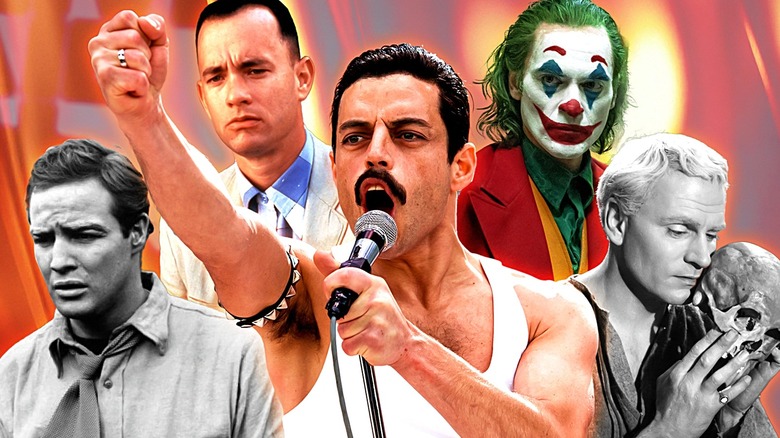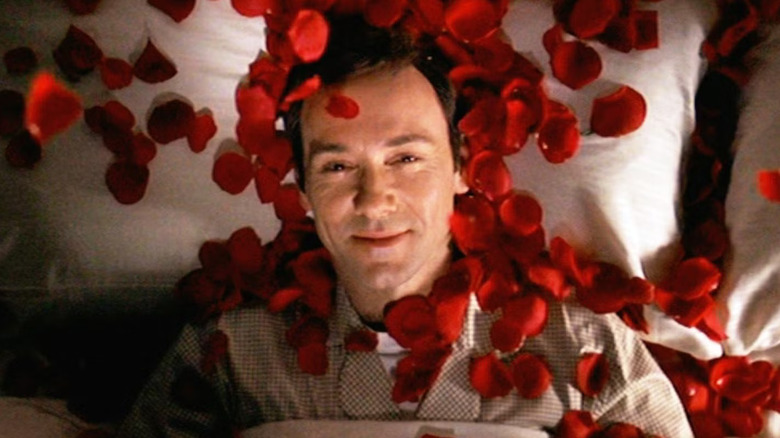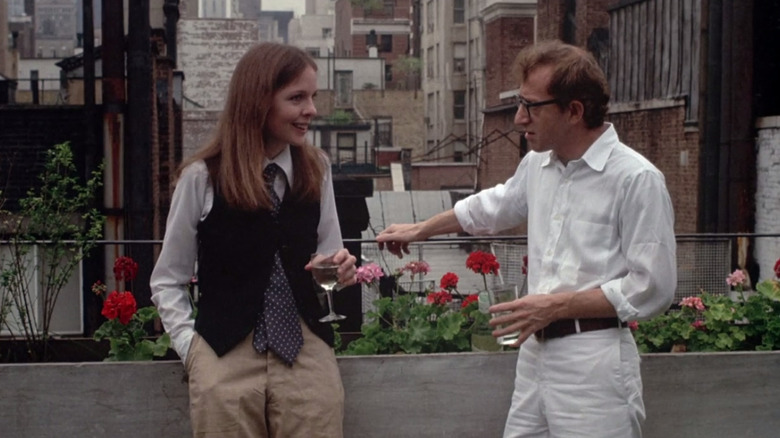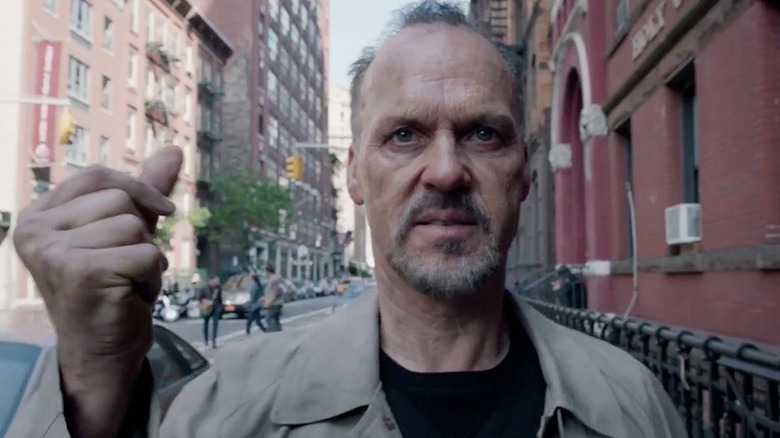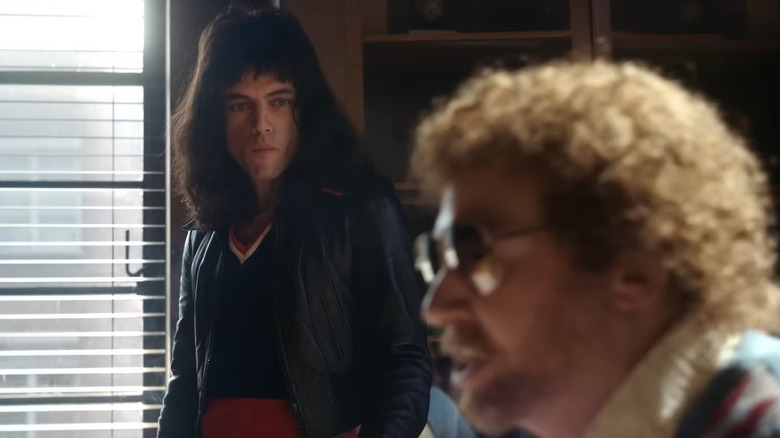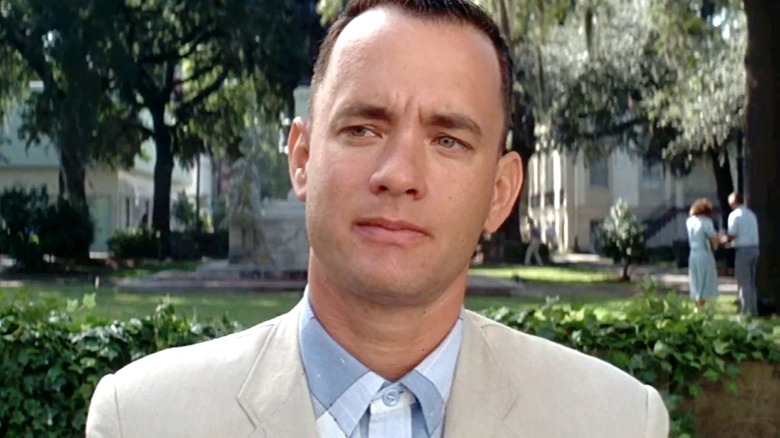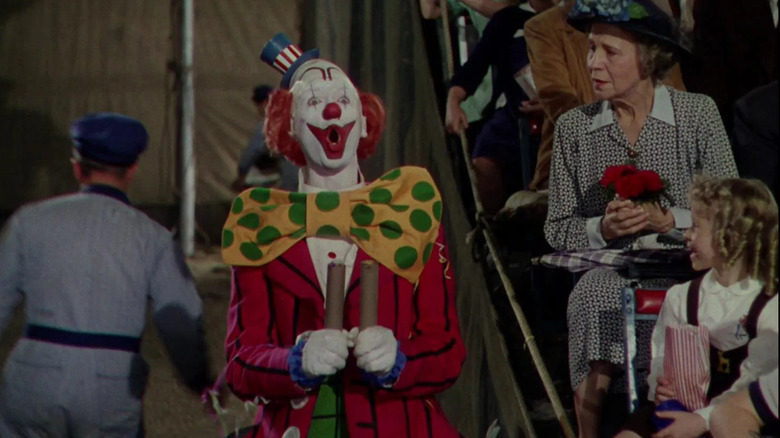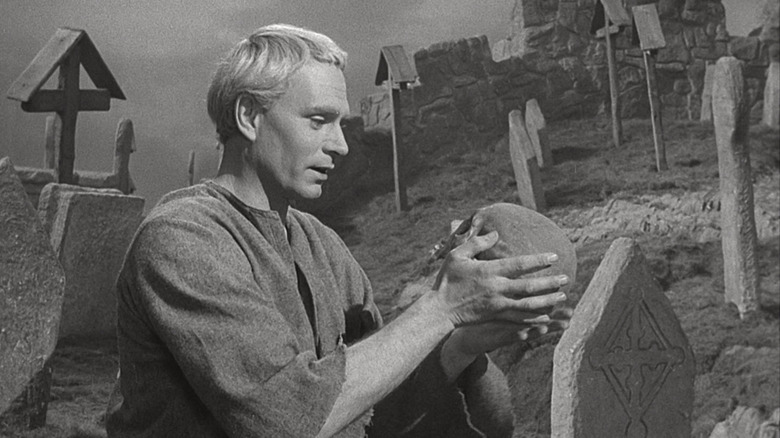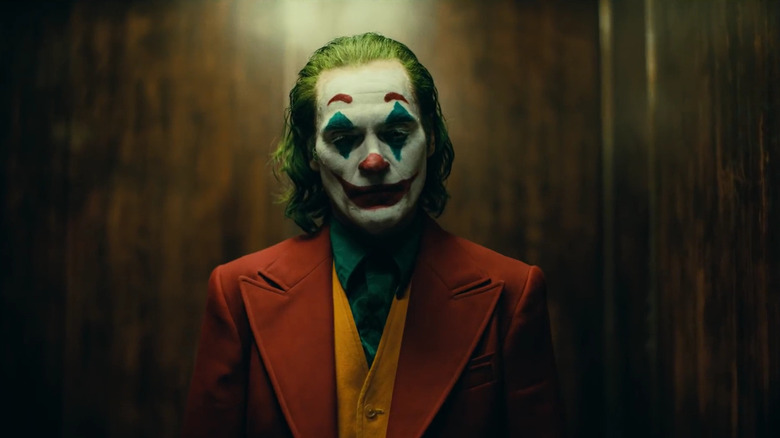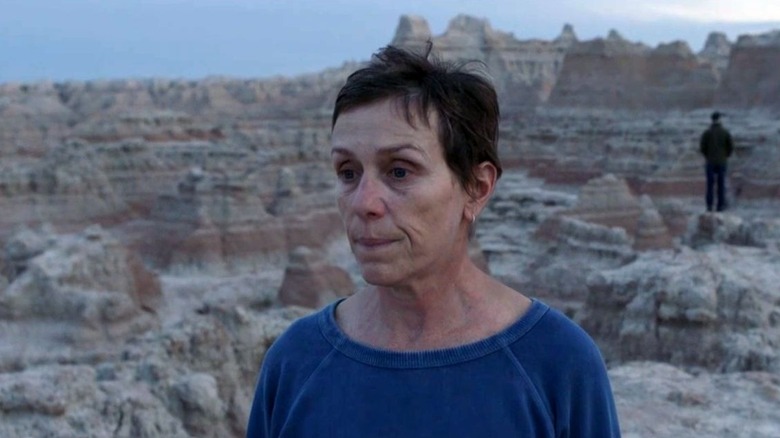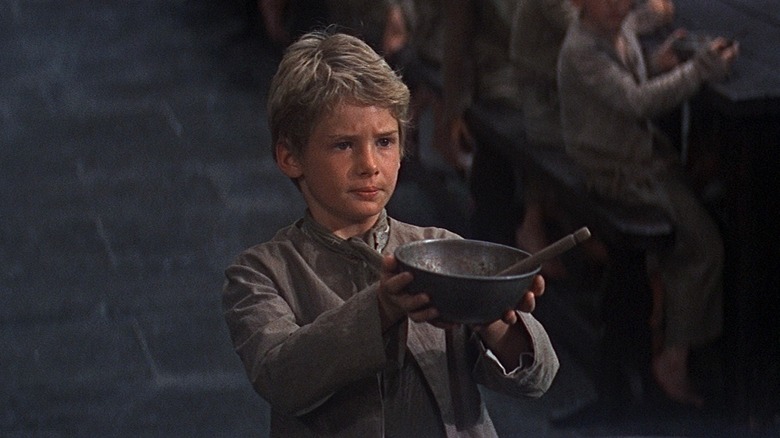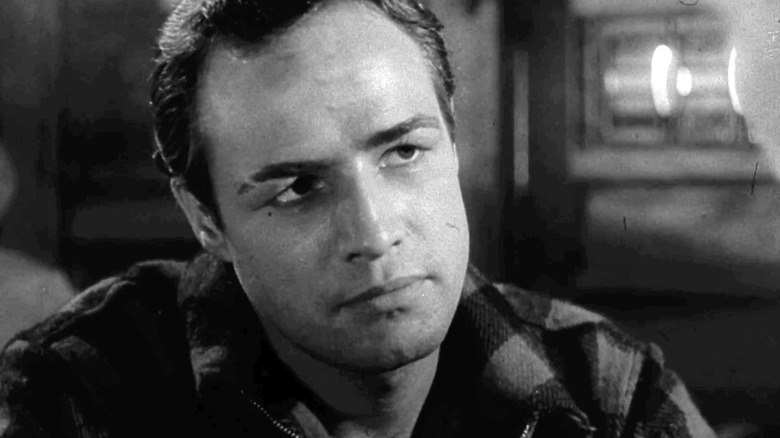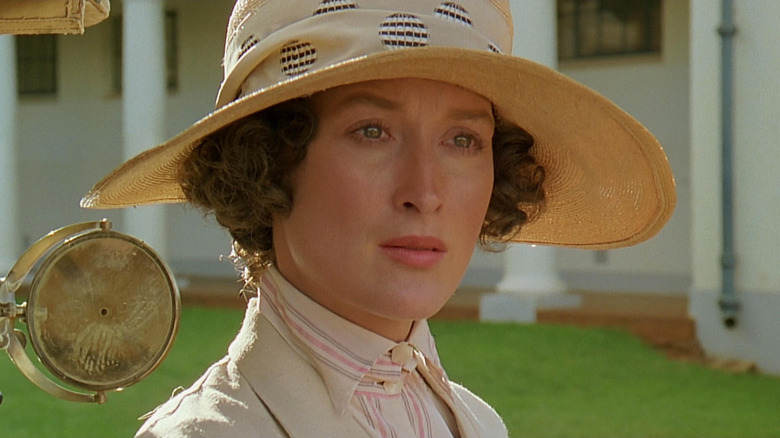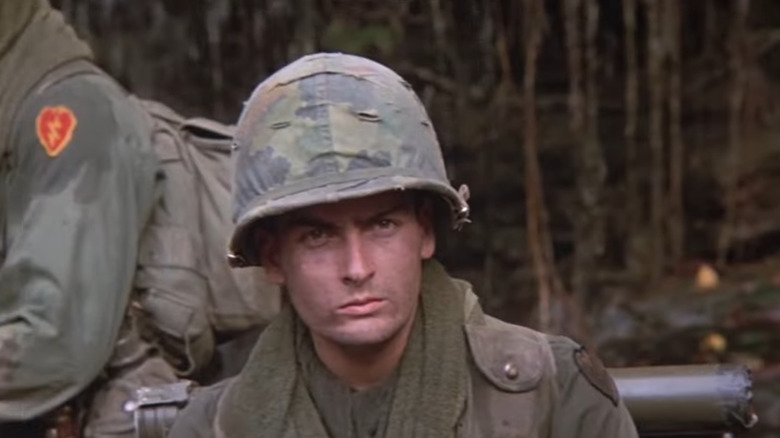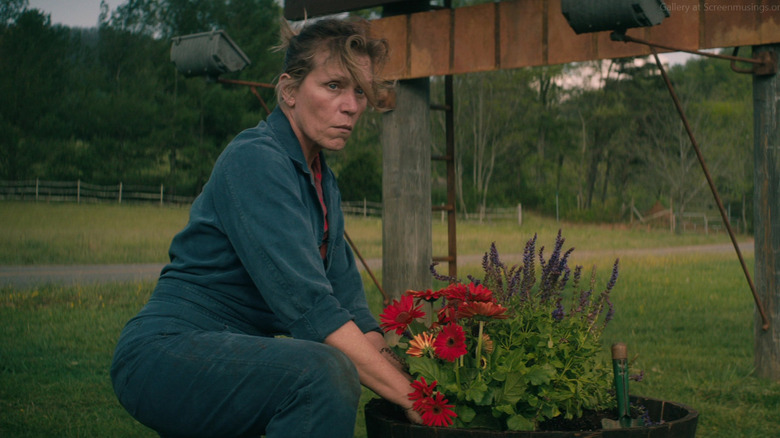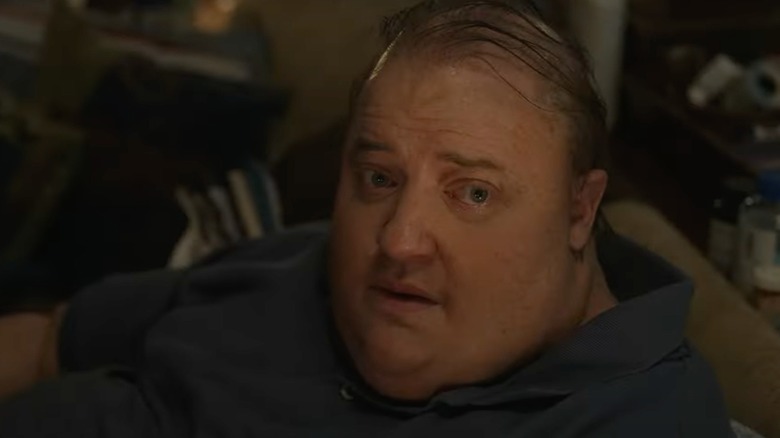The 15 Most Overrated Oscar-Winning Movies Of All Time
The Academy of Motion Picture Arts and Sciences has done lots of good for the movie industry, as both a business and an art form. Most notably, since the first ceremony in 1929, they annually honor a crop of the year's best films with the Academy Awards, colloquially known as the Oscars. These awards are often wonderful barometers of cinematic quality, drawing audiences toward films they might've otherwise never seen. But sometimes — or, depending on your point of view, quite often — the Academy gets it wrong. They ignore what's obviously the superior film of the year in favor of something milquetoast, suspect, or otherwise overrated.
Some of these notable films, whose wins almost immediately received cultural asterisks, include "Green Book," "Crash," and "Driving Miss Daisy." But others still need a touch of critical drubbing, and today is the day to humble these disproportionately honored flicks. With all this in mind, let's open the envelope for some hot takes as we discuss the 15 most overrated Oscar-winning movies of all time.
American Beauty
Let's put aside some of the startlingly unpleasant facts about the production of Sam Mendes' "American Beauty," like the fact that Thora Birch was only 16 when she shot her nude scene or the fact that alleged sexual predator Kevin Spacey stars as, and won an Oscar by playing, what more or less amounts to a sexual predator. Let's try to just focus on the text — the cliché, overcooked, and trite text.
Spacey plays Lester Burnham, an unhappy suburbanite with an unhappy wife (Annette Bening), an unhappy daughter (Birch), and an unhappy neighbor (Chris Cooper). As all of these characters try to unshackle themselves from modern ennui, fissures deepen and explode.
It's just that all of these fissures are so blunt, so obvious, and so predictable, playing with the immature depth of a precocious high schooler (not unlike Wes Bentley's character, who films plastic bags and eye-rollingly calls them beautiful). If you really want a psychologically bold look at the underworld of suburbia, try something like the potent and troubling "Blue Velvet," not this inane and self-satisfied Best Picture winner.
Annie Hall
Again, let's try to put aside the fact that Woody Allen, the star, co-writer, and director of Best Picture-winning "Annie Hall," is an alleged sexual predator. At least his arc in this film doesn't match the alleged crimes (watch "Manhattan" for that).
Like in many of his films, Allen plays a version of himself in "Annie Hall," a neurotic and pervasively analytical comedian who underwent the dissolution of an important relationship with the title character (Diane Keaton, who won an Oscar). Arguments are had, the philosophy of existence is mused upon, and Los Angeles is satirically eviscerated.
Here's the thing: Allen's Alvy Singer is so annoying. Yes, that is the point, and yes, I can hang with other movies with unlikable protagonists. But for all of Singer the character's desire for self-awareness and clarity, I feel nothing of the sort from Allen the filmmaker. It's a constant firing squad of pet peeves without any psychological acumen as to what it might mean — even if the WGA also honored it as the funniest screenplay ever.
Birdman
"BİRDMAN or (The Unexpected Virtue of Ignorance)" finds some juice, don't get me wrong. Presented as one continuous shot (a brutal filming method), Alejandro G. Iñárritu's Best Picture winner jolts with electricity when it zeroes in on its main character, actor Riggan Thomson (Michael Keaton, stunning per usual), and his attempt to put on a play that seems doomed from the start. When Riggan rehearses with a pretentious blowhard (Edward Norton) or barrels down the streets of New York to try and make an entrance on time, the thing sings.
But any time the movie zooms out and makes big, bold statements about the nature of art, fame, family, or "human existence," it falls flat on its face. The old adage of "showing, not telling" does not radiate through the movie's DNA, which loves to stop everything for an overcranked, over-obvious monologue. Let me come to these conclusions by watching your story, "Birdman"! It doesn't count if you just scream it at me!
Bohemian Rhapsody
Again, we must put aside personal controversy of credited director Bryan Singer, an alleged sexual predator who was fired from the director's chair of "Bohemian Rhapsody" (though still credited in the final cut). Taking "Bohemian Rhapsody" simply as a movie honored by the Academy, one can go more than slightly mad.
The biopic of Queen frontman Freddie Mercury (Rami Malek, winning an Oscar) travels through the greatest hits of a biopic, from melodramatic scenes of strife to organic conversations suddenly careening into the titles of hit songs to a giant crashout to a climactic, redemptive concert. And it does it all ... really badly.
Malek is fine as Mercury, whether he actually sang or not. Oscar-worthy? Probably not. But he's fine, I think. It's just really hard to qualitatively analyze when it's part of such a miserable tapestry. It's garishly shot, written clumsily, and has some of the worst editing of a modern motion picture I've ever seen. And then, somehow, it wins Best Editing?! "Stone Cold Crazy," indeed.
Forrest Gump
"Forrest Gump" is a pop cultural touchstone. Based on some real life inspiration, it's one of the most iconic Hollywood movies ever made, and a prime fixture in Tom Hanks' iconic filmography. The story of a simple man who pursues life, love, and happiness while every single moment of 20th-century American history happens around him blew up at the box office and the Academy, winning Best Picture, Actor, and Screenplay trophies among its accolades.
Look, I'm not, like, Mr. Grumpy. "Forrest Gump" has its obvious charms, and its Alan Silvestri score is one of the greats. But in the incredible film year of 1994, which saw stone-cold classics like "The Lion King," "Pulp Fiction," and "The Shawshank Redemption," "Forrest Gump" just doesn't compete.
It's soft and sloppy, sappy to the point of manipulation. Its broad survey of history is twee before "twee" was a common word. And the more I think about its poor influence on the trend of actors playing a kind of amorphous "mental disability" without a meaningful or sensitive definition, the more I want to throw the whole box of chocolates in the rubbish bin. 'Kay, maybe I am Mr. Grumpy.
The Greatest Show on Earth
Released in 1952, "The Greatest Show on Earth" comes from Hollywood icon and architect of spectacle Cecil B. DeMille. His Best Picture-winning work takes place in the Ringling Bros. and Barnum & Bailey Circus, following two rival trapeze artists competing for the spotlight.
DeMille spends lots of time spotlighting death-defying stunts and broad entertainment, stepping into the realm of "concert film" despite the presence of acclaimed actors like Charlton Heston and Jimmy Stewart. At times, its narrative even takes a backseat to pseudo-documentary showcases of the behind-the-scenes machinations of the circus apparatus.
All of this is technically interesting, and you're not gonna watch a DeMille movie without getting rocked by at least one sequence's bravado. But especially in a year that brought us movies like "High Noon," "Singin' in the Rain," and "The Quiet Man," there just isn't much to chew on in "The Greatest Show on Earth." Lotta greater shows on earth, and I'm not counting the TV show adaptation.
Hamlet
William Shakespeare is a very good writer, maybe the best. "Hamlet" is a very good play, maybe his best. Laurence Olivier is a very good actor, certainly one of the best of his time. But Olivier's "Hamlet" defies its mathematical odds, showcasing none of the best of any of these great materials.
Olivier directed and starred in the Best Picture-winner, playing the title Prince of Denmark on a murderous quest to get revenge on his dead father by killing his uncle, the current king who offed his brother to get the throne (and his marriage). Ghosts give messages, women fling themselves from towers, and skulls are soliloquized to — it's "Hamlet," baby!
Released in 1948, Olivier's take is both shockingly irreverent and beholden to a simplistic interpretation of the play. Simply put, he cuts out a decent-sized chunk of the material, including the notable Rosencrantz and Guildenstern. Therefore, it's literally incomplete, and what's left focuses too unsubtly on Hamlet's icky, incestuous relationship with his mother, a take I'd characterize as possessing almost "American Beauty" levels of obviousness. It is #NotMyHamlet.
Joker
Watching "Joker" feels like the product of feeding an artificial intelligence algorithm the entire filmography of Martin Scorsese, a listicle of "the most disturbing movies of all time," and a YouTube explainer of trendy color correction. It gestures at all of these touchstones loudly and smugly, insisting it reaches heights worthy of our consideration while offering not one original or interesting (or even competently sequenced) thought.
It's not a bad idea on paper, I don't think! Placing iconic Batman villain the Joker into a kind of '80s New York City exploitation thriller makes sense, and is in line with a lot of other Batman adaptations' reverence to film genre and era. And Joaquin Phoenix is gonna play him? How could we lose?
Well, Phoenix won the Oscar, and we all lost. "Joker" convinced culture, if just for a moment, that its breed of incoherent, masculine pseudointellectualism is worthy of our value and attention. Maybe that's the ultimate punchline? I dunno. Just watch "The King of Comedy" instead.
Nomadland
"Nomadland" has one trick that it pulls over and over, to diminishing returns. It frames its subjects in a floating close-up, just off-center, reacting to the doldrums of American life in and out of mainstream society. I don't get any sense of elucidation or opinion on the matter, a matter worth being elucidated about. I just get this one off-center close-up shot 19,000 times in a row, intercut with what I would charitably call "tableaus of poverty porn". And this wins Best Picture?!
There's somewhat of a plot, though filmmaker Chloé Zhao (who won the Best Director Oscar) is more interested in reality-blurring and poetically staid vignettes than a trackable character change. Oscar winner Frances McDormand plays a character named Fern, her real-life nickname, a modern nomad who drifts through American deserts and camps in her van.
Many of the people Fern meets are real-life nomads, and these scenes, while grinding any cinematic verve to a halt, are at least anthropologically interesting. But when Zhao hurls Fern through some late-movie story maneuvers, it weakens both sides of the "documentary vs. fictional" debate of the film.
Oliver!
"Oliver!" is pretty fun! Based on the musical adaptation of Charles Dickens' "Oliver Twist," Carol Reed's film has some ebullient sequences and charming characters, with some simplified and melodramatic darkness to keep it both momentous and family-friendly. Mark Lester plays the title orphan, who joins the fray of pickpocket Fagin (Ron Moody) and his merry band of child thieves as they sing and dance their way through 19th-century London.
It's good, cheesy fun, filled with catchy, if anachronistic, tunes (it's endlessly funny to me that Oliver's big ballad, "Where Is Love," feels like an easy listening soft rock tune). It is not worthy of the Best Picture mantle, however. It's simple and harmless entertainment, a good time that doesn't vault into any higher level of reflection or appreciation once it's over.
And that's before you remember 1968 was also the release year of "2001: A Space Odyssey," a historically controversial Oscar snub. Where is love, indeed.
On the Waterfront
A smash hit, a multiple-Oscar winner, a breakout for its star, a near-perfect Rotten Tomatoes score that regularly shows up on "best movies of all time" lists, and a member of the highly esteemed Criterion Collection. Unfortunately, here comes Mr. Grumpy once again.
"On the Waterfront," which earned Academy Awards for Best Picture, Director, and Actor, among others, is an often frustrating watch, though not for the reasons the movie wants it to be. Marlon Brando plays Terry Malloy, an ex-prizefighter now working for a corrupt group of dockworkers. These dockworkers order Terry to abet in the murder of a potential snitch, and when Terry starts falling for the victim's sister (Eva Marie Saint), everything boils over to a head.
It's in this central relationship that I start to feel aggravated. Saint's character ostensibly doesn't know who killed her brother, and despite everyone in the town insisting Terry probably has something to do with it, she spends so much of the film in an unbelievable, unexplored state of obstinacy. Combine that with Saint and Brando's wildly disparate acting styles, and "On the Waterfront" starts to fall apart from the inside out.
Out of Africa
A sweeping, epic romance shot on beautiful locations, "Out of Africa" stars Meryl Streep and Robert Redford (the latter of whom taught the former an important lesson) as star-crossed lovers who reckon with royal procedure, patriarchal repression, and military conflict in the pursuit of their passion. It's also all ostensibly based on the true life of Karen Blixen, who wrote several memoirs that the Oscar-winning screenplay was adapted from. What's not to love?
It is shallow criticism to call any film, let alone a Best Picture winner, "boring." But yowza, am I relentlessly bored by "Out of Africa." It has attractive and talented stars falling in love in the beautiful jungles of Africa, and I feel nothing. Perhaps it's so handsomely mounted and patiently paced that it loses some of the visceral spark I need from depictions of romance.
It's also politically simplified, to put it gently. Any depiction of white colonialists in Africa deserves extra levels of sensitivity and intention, but here, these sociopolitical concerns feel like incoherent seasonings. A white savior complex here, an "aiding and abetting a colonialist militia" there — as long as people are falling in love, who cares, right?
Platoon
"Platoon" comes to us from provocative auteur Oliver Stone, who turned his autobiographical experiences in the Vietnam War into a multiple Oscar-winner, including Best Picture and Director. The story, simply, concerns the choice between morality and corruption when faced with unbelievable circumstances like the Vietnam War. Charlie Sheen is a new, young Army volunteer constantly found at odds with two superiors, the more compassionate and sensitive Willem Dafoe, and the mercurial and selfish Tom Berenger (Sheen was also at odds with Stone, almost walking away from the production).
Stone stages a series of successfully upsetting sequences, reminding the viewer how hellish war can get. But nothing about these sequences, nor the film's moral conclusions, nor its flirtations with what I might call "action-horror" setpieces, feels in any way nuanced, leaving an audience bombarded though not necessarily moved.
I respect Stone's personal experiences, and I respect his intentions in communicating his experience however he wishes. But the film's particular style of communication does not compel me toward any meaningful change, something I tend to look for in any film, Oscar-winner or otherwise. For a more successful film on a similar topic, may I recommend Brian De Palma's "Casualties of War"?
Three Billboards Outside Ebbing, Missouri
It takes big swings, I have to give it that. Martin McDonagh's third feature film "Three Billboards Outside Ebbing, Missouri" is tonally adventurous, giving its actors ample room to make bold choices among incendiary topics. And it won a pair of acting Oscars for its artistic troubles — Actress for Frances McDormand and Supporting Actor for Sam Rockwell.
McDormand plays Mildred Hayes, a woman who takes out enormous billboards to call out her town's police department for the unsolved rape and murder of her daughter, Angela. This particularly irks Rockwell's Jason Dixon, a rambunctious and wantonly prejudiced policeman, resulting in a calamitous chain of violence that changes the whole town.
The thing about "Three Billboards" and its constant need to experiment and reinvent itself is, it makes for a borderline incoherent watch. The film has no idea whether it's trying to be funny, empathetic, outraged, or straight-up mean, so it tries all of them, sometimes within adjacent line readings in the same scene. I never once felt in secure hands watching the film, and I will never understand its Academy acclaim.
The Whale
If you forced me to name the worst film of the 21st century thus far, I just might have to pick "The Whale." Like "Bohemian Rhapsody," this won an Oscar for its leading actor, in this case Brendan Fraser, and I suppose he's fine. He's just performing in service to a hellaciously doomed product, a whirlwind of terrible choices that makes one question the validity of "writing" as a viable art form. Mr. Grumpy is taking the gloves off!!
Fraser plays a morbidly obese English teacher who stays at home eating himself to death. He teaches his class over Zoom, enjoys a somewhat strained relationship with his caretaker, Hong Chau (Oscar-nominated), and tries to reconnect with his estranged daughter, Sadie Sink.
He's not really a character, I don't think. He's more like a lightning rod of circumstance and talking points, a punching bag for screenwriter Samuel D. Hunter, adapting his own play, to work through a bunch of overblown and melodramatic screeds. Still, I feel pity for him, and not just because Hunter and director Darren Aronofsky biologically need me to. I pity that he can't be a character, a human, because of the movie he's stuck in. Sorry, Brendan!
